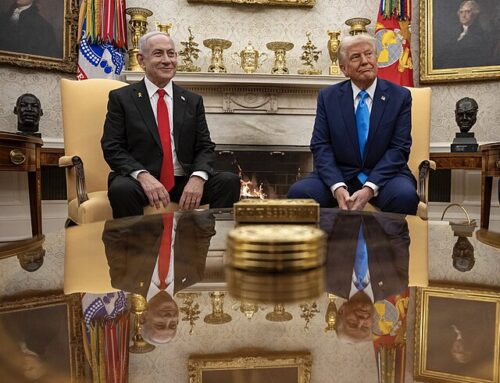Paul Scham, who teaches Israel Studies at the University of Maryland, originally meant some version of this as a comment on my initial post on Fatah-Hamas unity, but he felt a need to modify it as a result of Haniyah’s declaration a few days ago that Hamas will never accept Israel. But this did not change Paul’s fundamental view. I don’t necessarily disagree with Paul; I think it’s possible that Hamas can take a back seat to Fatah negotiating peace and then accept it by default. Yet I’m not optimistic. I will provide a fuller response beneath Paul’s comment.
From Paul Scham: It’s ‘Good for the Jews’
I think it ought to be recognized that Hamas-Fatah unity is “good for the Jews” — and Israel. Thus, Israel advances its own interest in a viable two-state solution by accepting that. (Obviously I am arguing in the abstract. Even Kadima and Labor, let alone the current government, are a long way from accepting that premise).
The primary reason for this is pragmatic. It is a fact that has been true for years that Hamas represents between 25-35% of Palestinians. Even if Fatah were to try to make peace on its own, Israel can’t accept that because a huge chunk of the Palestinian people and leadership wouldn’t have bought in. I doubt Fatah would try to sign a treaty in the face of Hamas’s opposition; if it did there is little reason to believe it could be enforced.
However, Hamas will not, I believe, under any currently imaginable circumstances, “recognize” Israel. Its ideology will not stretch that far. However, I believe it might well accept such a peace, and perhaps even be part of a government that makes such a treaty.Why should Hamas be expected to recognize Israel? Hamas is many things – a party, and a terrorist group among others – but one thing it is not, and has never claimed to be, is a government. If Hamas is a part of a government that wishes to make peace, then that government will have to deal with Israel on a government to government basis. Only governments recognize other governments.
I have spelled out the reasons Hamas may agree to be part of a government that makes peace with Israel while still refusing to recognize Israel itself in a much longer piece that the US Institute of Peace published in 2009 and which is available online for download, and again in an article published at the end of January, in The National Interest.
That would be a stronger peace than waiting around for Hamas to do something it will never do. Hamas has given numerous signals it would accept a two-state solution, based on the 1967 borders. Of course it has also indicated the opposite. It should be challenged to make peace with Israel in a fair two-state context simply because Hamas has to be part of any enduring solution, and a two-state resolution of the conflict is in Israel’s interest.
It is not our business how Hamas makes it internal decisions. What is important is that a duly constituted Palestinian government, which is able to maintain itself (i.e., with the tacit acceptance or participation of Hamas) makes a binding peace with Israel. Pursuing an empty “recognition” will simply mean maintaining the current stalemate.
Encouraging Palestinian unity and being willing to deal with Hamas are not favors but moves that are in Israel’s interest. Nor am I ignoring that Hamas is opposed to Israel’s existence. At the moment we see unusual dissension in Hamas’s ranks with its outside leadership leaving Damascus, possibly to end up in Qatar. There is tension in its relationship with Iran, which it is trying to repair, but they differ strongly over Syria. Meanwhile, Hamas’s elder brother, the Egyptian Muslim Brotherhood, almost certainly being the senior party in a government which will have to maintain the peace with Israel. Thus, it will be more difficult for Hamas to carry out a program of violence.
Israel (and the US) should be taking advantage of this time of changes by actively trying to help maneuver Hamas into a position in which it is close to moderate states like Egypt (assuming it reconstitutes itself), Jordan, and Qatar. It should likewise be encouraging Palestinian unity, because that is a prerequisite to any enduring and mutually beneficial relationship with the Palestinians.
My response: Explain it to the Jews (and don’t discount or berate their skepticism)
It is hard to envision peace between Israel and the Palestinians without the eventual acquiescence of the 20 to 45% of the Palestinian population which variously supports Hamas. But the more moderate leadership of the Palestinian Authority needs to make every effort to explain to the understandably skeptical majority of Israeli Jews (and the Israeli government in particular) how unity would be a step toward a peaceful resolution of the conflict and not the beginning of a broader coalition of anti-Israel forces. Otherwise, this simply adds to the basis for distrust.



Kol hakavod for these excellent analyses. I hope they are widely read and acted upon.
I think the bottom line that should be stressed is that Israel needs a sustainable resolution of the conflict with the Palestinians to avoid renewed violence (with an estimated 200,000 missiles and rockets aimed at Israel), to effectively respond to economic, environmental, and other domestic problems, and to remain both a Jewish and a democratic state.